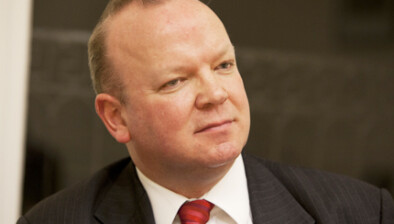Michael Upton: A Valediction – forbidding mourning thoughts on leaving the European Union

Michael Upton
Senior Scottish advocate Michael Upton reflects on the UK’s departure from the European Union.
So Brexit is done.
My mother still recalls the news on 19 April 1945, sixteen days before the war’s end, that Germans had executed her grandfather in prison in Copenhagen for membership of the Danish Resistance. His daughter and son-in-law, my Danish grandparents, had themselves not long before been released from German imprisonment. Unbeknownst to them the grandmother and mother of the woman whom I was later to marry had just arrived in Denmark from what is now Lithuania, as German refugees fleeing the Red Army. Nearby in Holstein, my father-in-law’s family as Italian immigrants experienced the change from living in an allied to an enemy Germany when Italy switched sides. My father had prepared for D-Day more peacefully – acting as occasional human ballast in landing-craft tests on the Thames.
You may like me be a Euro-mongrel: out of these strands was born an upbringing in Britain and Denmark; my education in the European Union’s laws at its university in the old abbey on the inexpressibly beautiful hillside above Florence (thanks to Neil MacCormick); my crossing the continent by bicycle; and ultimately my dual-nationality, bi-lingual Anglo-German family.
Like many readers, I have made professional visits to the EU’s four main institutions, and have for 30 years taught, written about and practised in the field of its laws. Few of my boasts are prouder than that my Belgian god-daughter’s father was one of the authors of the EU Constitution (the Lisbon Treaty as it became). After the winter of war, in the long summer of Europe’s late twentieth century, I was raised among four languages in an implicit belief in European unity.
And that does not equate to belief in membership of the European Union.
The flaws of the EU are as extensive as the corpus of its law. It is flawed at many levels.
Few reasonable people would argue that in Scotland or Britain, only civil servants should be able to propose laws – or that alongside basic constitutional freedoms, trade policy and the details of competition law should be fundamental law, changeable only by constitutional amendment requiring unanimity – or that the Supreme Court should be bound by a default-rule, that in case of doubt disputes are to be resolved in whichever way will render the United Kingdom “an ever closer union”. Many might even question the sanity or good faith of proposing these as building-blocks of our national constitution. Yet they are basic to EU law.
The incorporation of competition law into the Treaty on the Functioning of the EU has always been a particularly acute moral paradox. Art. 101 makes it fundamental law that undertakings may not form cartels, with members trading on advantageous terms denied to outsiders - and there stands art. 101, in seemingly radical innocence of the fact that all around it the rest of the Treaty makes it equally fundamental law that the EU itself shall be precisely what it outlaws.
But perhaps even more basically, the EU has been judged undemocratic, by minds as diverse as Enoch Powell and Michael Foot. The point comes down to this: EU laws are not made by and at the initiative of a directly-elected legislature.
Paradoxically, this is borne as much out of member-states’ wish to constrain the EU’s power as out of a policy of imposing unity through the agency of unelected officialdom. The EU could be rendered absolutely democratic, by endowing the EU Parliament with absolute sovereignty – but the coalition against any such reform would have made political allies of even Angela Merkel and Nigel Farage.
Instead, the attempt to reconcile the Union’s objects with member states’ interests led to legislative procedures which sadly only a specialist can describe. The procedure of a bill through the Scottish Parliament, or the Houses of Parliament, is easy to grasp. Intelligibility is critical to accountability, and accountability to democracy. Here the EU fails. Who shall narrate its Co-decision Procedure – via the formal and the informal trilogues?; the Consultation Procedure – differing between the Consultation Procedure involving the Parliament, and the Consultation Procedures involving the Committee of the Regions and the Economic & Social Committee?; the Consent Procedure?; the procedure for joint Council-Commission acts under arts. 31 & 207 T.F.EU?; Commission legislation under Treaty powers?; Commission legislation under delegated powers?; Treaty revision by ordinary revision procedure?; Treaty revision by simplified revision procedure?; Treaty revision by Passerelle clause?; etc.?
A consequent curiosity of our politics has been how few Remainers have seemed able to explain how EU laws are made, while people marched in the streets for constitutional principles that they could not paraphrase. It seemed a long way from the popular progressive politics of the Chartists or John Maclean. Perhaps understanding is not always a precondition of loyalty.
Is the alienating complexity of EU legislative procedure undemocratic? In the Venetian Republic, the Doge was after all freely elected – the names of 30 members of the Great Council were chosen by lot, from whom 9 were selected again by lot, which 9 chose 40 names, from which 12 were selected by lot, which 12 put forward 25 names, from which 9 were selected by lot, who chose 45 new names, from which 11 were selected by lot, which 11 chose 41 new names … who finally elected the Doge.
If we are not today inclined to adapt Venice’s rules to select our leaders, we may agree that complexity and obscurity are irreconcilable with the accountability required for democracy.
Prominent among the consequent ill-effects is the over-reaching detail of EU regulation of ordinary life. Less could have been more. But instead it was given sufficient rope to hang itself in over-ambition – because of art. 5 of the Treaty on European Union’s verbose failure to articulate a chief need of any federation’s constitution: a clear demarcation of states’ rights and Union powers.
Some Leavers attribute such flaws to malign motives. But while we cannot look into all hearts, and Brussels’ well-paid incumbents would only be human in seeking to retain what they have acquired, conspiracy is superfluous to explain why in any ranking of constitutions as literary works, the EU treaties have ended up looking more like than McGonagall than Tennyson.
Admittedly, when we British evolve our own constitutional dogs’ breakfasts, we are inclined to make a virtue of them, and praise them as the blessings of the inductive method. Brussels is not unique in lacking the humility to admit that there might be better ways of doing things. But EU harmonization and established nation-state democracy could have been better reconciled.
Take mutual laws of jurisdiction, for example: the Brussels I Regulation régime worked fairly well when it was simply the Brussels Convention, to which a member-state could sign up à la carte. But that was a model which, on the whole, the EU rejected. In private law, the admirable work on a Common Frame of Reference for harmonizing European contract law has long argued for contracting-in as a route to implementation. Member-states and (in certain fields) individuals and companies could have been left vastly more freedom to opt in to harmonized single-market laws; for example, if their national parliaments so voted.
The result would have been a patch-work – offensive to those who see virtue in uniformity. If one member-state rejected a higher quality standard for goods, it might have saved on manufacturing costs, but lost on market reputation. The debate between Aesop’s dog and wolf could have been incremental rather than once for all time. Such freedoms are not simply messy but involve real costs. Yet their benefits can be unquantifiably valuable, if they foster the sense in each community that its law - native or EU-harmonized – is its own, because it is what its own accountable legislature has freely chosen. Fundamental opt-outs – such as Denmark’s on native ownership of property – have never been incompatible with the greater good of European union, because they fostered its legitimacy. The economic power-house of the Anglo-Scottish Union never depended on a premise that ever-greater centrally-imposed legal harmonization was an ideological imperative – as opposed to something which might profitably be adopted, case by case. Even Scotland itself long-lived with differing local land tenures. Offering every country in Europe (and beyond) options for harmonization would have been – may yet be – messier. But it would also have respected the important possibility that historically it was actually intra-European competition which caused the continent to lead the world in many fields of human achievement. It might yet do so. It might be a way of building more slowly, but more surely.
To repeat then, European harmonization and national democracy could have been better reconciled. They could be still. It is not too late. Indeed, the whole debate about future British regulatory alignment may present marvellous opportunities to test what is possible: what can be done by co-operation rather than compulsion.
That could also provide object-lessons in how to serve the public and its lawyers by drafting laws clearly. The British ‘statute book’ is bad enough, but even it is not quite as ludicrously, laughably impenetrable, complex – and simply very badly written, such that Swift himself could not have parodied it – as the written body of EU law, which regularly trips up even the long-suffering civil servants who have to try to administer it
Nor might it be too late – I owe it to T. B. Smith to point out – to begin to remedy the way in which EU law curiously turned its back on much of the true European legal heritage of Roman law. For almost two millennia we have had, for instance, the benefit of Gaius’ distinction of private and public law – so it was redundant to re-invent the wheel very badly with barbarisms such as ‘horizontal direct effect’ to describe concepts our familiarity with which is age-old.
Terminology and drafting matter, because communication matters. So does the register with which the law-maker addresses the public: we may wonder what Burns’ man of independent mind would think of a law called a ‘Directive’.
The pursuit of European unity is unquestionably a good thing - and it can work - and it does work in NATO, and the Council of Europe, and the OECD, and many more specialist associations. The EU as we have known it may prove to be superfluous. Or it may yet prove that the EU can be the most useful of all of these vehicles, pursuing harmony à la carte through national democratic institutions – and finally in plain, intelligible prose.
But the unquestionable, manifest, factual unity of Europe is to be found in and cultivated by each of us. It is to be found in savouring Dante, wondering at Beethoven, laughing with Tati, smoking pot in Amsterdam, summiting on the Matterhorn, and cycling the banks of the Danube – and all the while being loyal to the Vatican, having faith in Luther’s reforms, or sharing Voltaire’s doubts. Our shared European culture, international friendships and marriages, and a common sense of what is right, what is wrong and what is beautiful, all long precede every EU Directive and will long outlast them all. If this may be brought home more often to Euro-mongrels, it is still true for us all.
So being European is nothing we may sub-contract to politicians or to laws. For example, if we in Scotland really do particularly pride ourselves on being European, then we could start by learning our neighbours’ languages. One place to Remain sincerely is in the language class-room.
No one needs the EU in order to be European. Only dull sublunary lovers’ love requires inky blots or parchment bonds. The shared legal, religious and artistic culture gives inter-assurance of minds across the Channel. The souls of the continent and the island endure not a breach, but an expansion. We are virtuous folk and pass mildly away: so let us melt, and make no noise, no tear-floods, nor sigh-tempests move; ‘twere profanation of our joys to found on Brussels’ laws our love.
Brexit is done.
Michael Upton, Scottish advocate, holds an LLM in European Law from the European University Institute at Fiesole, and wrote the legal text of the Draft Constitution for the European Union, in the European Constitutional Group’s Proposal for a European Constitution.









